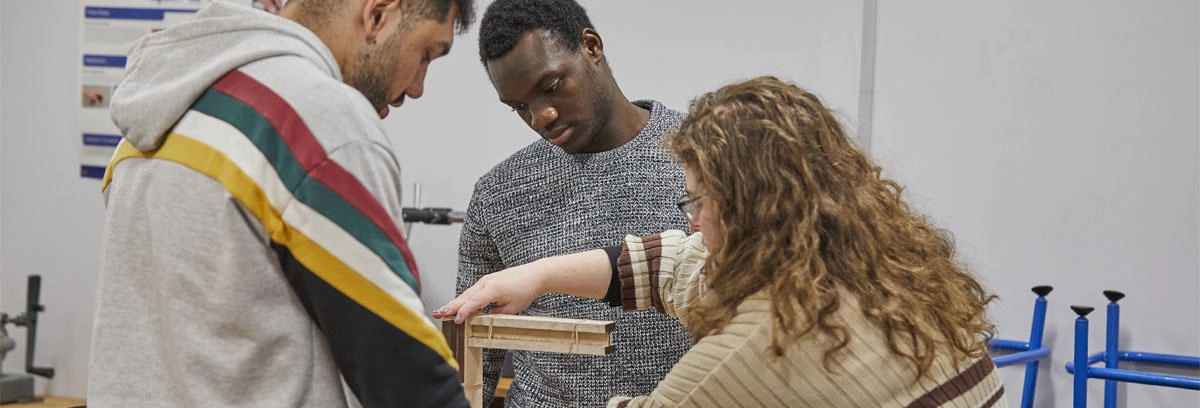MEngMechanical Engineering
Contact admissions
- 4 years
- 5 years with foundation year
- 8 years part-time
- 9 years part-time with foundation year
Why study a mechanical engineering integrated master's degree at Solent University
Develop advanced mechanical engineering skills and knowledge for a cutting-edge career. Gain valuable hands-on experience with industry-standard tools and innovative technologies.
- 0thin the UK for student satisfaction in mechanical engineering, out of 74 institutions (CUG 2026)
- Top0%of UK unis for teaching quality, out of 130 institutions (Times Good Uni Guide 2026)
- 0thuni in the UK for First/2:1 degrees, out of 130 institutions (Times Good Uni Guide 2026)
- You'll be taught by an expert team who work closely with industry.
- Industry-relevant curriculum covering cutting-edge topics such as automation, smart materials, and sustainable engineering.
- Opportunity to work on live briefs from industry, providing real-world experience and networking opportunities.
- You can study this course part-time.
- You'll learn using state-of-the-art facilities, including our applied mechanics laboratory.
- You'll work on an interdisciplinary group project in your final year, helping you to develop crucial teamwork and project management skills.
Any questions?
Contact international admissions
Email: Call:Course overview
This integrated master's degree (also offered part-time) provides a stimulating and intellectually challenging programme of study to prepare you for an engineering or technology related career in a design or service-providing organisation.
The course has an emphasis on hands-on learning and real-world problem-solving which aligns with industry demands for graduates who can hit the ground running. You'll study modules in automation, smart materials, and advanced manufacturing and will use tools such as CAD and simulation software commonly used within the industry. You'll also experience 'real-world' and work-based learning with opportunities to work on live briefs from industry.
As well as practical skills, you also develop your creative problem-solving skills to develop innovative and appropriate solutions to mechanical engineering problems, using emerging and existing technology. You'll also expand your business acumen with modules covering contracts, quality management, and business to increase your commercial awareness.
By combining technical expertise with these sought-after skills, graduates of this programme will be well-positioned to excel in the evolving landscape of mechanical engineering, ready to tackle the challenges and opportunities of this exciting industry.
If you’re looking to study our mechanical engineering integrated master's degree but don’t have the relevant qualifications or experience, the STEM foundation year will help you develop the core skills and knowledge to progress. Find out more about the STEM foundation year.
The part-time version of this course is ideal for those already in employment in a similar discipline who wish to boost their current skills gained in industry with an MEng qualification.
Accreditations
Part of:

Who is this course for?
The MEng Mechanical Engineering is ideal for ambitious students who are passionate about advancing technology and solving complex engineering challenges. This is the perfect course if you enjoy hands-on practical training and want to apply theoretical concepts to real-world problems, and aspire to a leadership role in industry or research positions in academia.
What does this course lead to?
An MEng in Mechanical Engineering opens up a range of exciting and innovative career opportunities across different industries, including, design engineer, manufacturing engineer, aerospace engineer, automotive engineer, robotics engineer, HVAC engineer, materials engineer, research and development engineer, and mechatronics engineer.
Meet the team

Dr Nils Bausch
Course Leader

Dr Fayyaz Rehman
Associate Professor

Dr Graeme Smith
Senior Lecturer

Dr Laurie Wright
Associate Professor of Marine Sustainability

Dr Puja Mishra
Lecturer

Dr Sinan Khwandah
Lecturer

Dr Tony Morris
Senior Lecturer

Dr Whysnianti Basuki
Associate Professor

Dr Abdulla Tahhan
Lecturer

Trevor Bullman
Technician Instructor

David Hawkins
Associate Lecturer

Brenda Short
Associate Lecturer

Dr Shehu Yusha’u
Lecturer
The University cannot guarantee any particular members of staff will teach specific aspects of the course in the future, but will endeavour to ensure the teaching team maintains their balance of experience and qualifications.
Facilities
Students benefit from a range of multifunctional workshops and labs, including a dedicated computer/CAD suite. Specialist facilities include a production and electronics laboratory for designing, building and testing electronic circuitry; and a heat treatment laboratory containing furnaces that can heat treat steels and alloys. Non-destructive testing, including XRF analysis, is also available.
The materials testing laboratory has large tensile testing machines, and the manufacturing laboratory features a range of advanced equipment such as a range of additive manufacturing equipment that can produce detailed 3D printed components, a rapid prototyping machine, and a laser cutter.
International opportunities
Broaden your horizons by adding an international dimension to your CV – essential to achieving success in today’s fast-changing, global environment.
Studying, working or volunteering in another country could be the experience of a lifetime. Enhance your degree by developing important global skills such as knowledge of other countries, language skills, intercultural awareness, adaptability and confidence.
For more information, please email international.mobility@solent.ac.uk.

What you'll study
Core modules
Science and Engineering Foundation Skills
In this module you will develop a range of key skills and knowledge designed to help you develop the underpinning knowledge and skills for the remaining modules of the course. This can be broadly categorised into: communication skills; collaborative skills; numeracy skills; information and communication technology skills and problem solving skills.
Fundamental Mathematics for Science and Engineering
You will build on the Science and Engineering Foundation Skills module, exploring fundamental approaches to mathematics, such as numbering systems and Boolean logic.
STEM Concepts and Processes (Applied)
You will plan and undertake experiments, or validate numerical models, related to science and engineering related topics from a range of general areas related to the parent degrees supported by the course (these are outlined in more detail in the STEM Concepts and Processes (Theory) module).
STEM Concepts and Processes (Theory)
You will study theoretical science and engineering related topics from a range of general areas related to the parent degrees supported by the course.
Personal Development Planning
This module is designed to help you to develop a range of transferable academic and career planning skills.
Degree-Related Project
The learning on this module is primarily derived from an experiential approach, enabling you to apply the skills and knowledge from the other modules to the analysis of a real problem related to your interests.
Core modules
Applied Mathematics
On this module you will learn how to apply a range of mathematical techniques to realistic engineering problems. You will use basic algebra and solve simultaneous equations and equations of straight lines to answer engineering problems around linked variables in mechanics and electronics.
CAD and the Design Process
The aim of the module is to demonstrate the role of an engineer as an engineering designer. This module is designed to foster an understanding of the fundamentals of the engineering design process and its various stages. It equips you with theoretical and practical technical knowledge to design a product by going through the various stages of the design process.
Mechanical Principles
This module will give you an understanding of the fundamental principles used by engineers to design vehicles, machines and buildings. You will learn to analyse forces on the performance of machines and structures and how to conduct tests and experiments to confirm the results on your analysis.
Core modules
Introduction to Electronics
This module is designed to introduce you to the electrical and electronic principles necessary to analyse circuit behaviour and design. It also provides the foundation for further study of more specialised electrical/electronic engineering techniques used later in your course.
Manufacturing Principles
This module helps you to develop an awareness of the factors affecting the selection of materials and processes used in manufacturing a product. It does this by comparing the attributes of materials and the suitability of processes in the light of the external factors that need to be considered when developing the product design specification.
Professional Engineering Skills
This module will introduce you to the profession of engineering. This includes both theoretical and professional skills relating to the role of the professional engineer and also supports your transition into higher education.
Core modules
Applied Maths for Mechanical Systems
The aim of this module is to build upon the skills and knowledge gained at level 4 by applying the appropriate mathematical principles and methods to problems involving mechanical systems.
Engineering Materials
This module provides the fundamental background concepts and aims required to develop understanding of the properties, processing and use of materials. The module introduces the relationship between the structure and properties of materials, and relates this to applications of materials in engineering.
Modelling and Mechanics of Products
Continuing the Design theme, this module progresses your basic knowledge of design and 3D modelling, developed in Level 4 to modelling of complex mechanical products and theoretical design of mechanisms.
Core modules
Automation and Control Systems
On this module you will learn/develop your understanding of a variety of vital underpinning mathematical techniques, such as; Laplace Transforms, Fourier Transforms, Vector Analysis, Control Stability Theorems (such as Routh-Hurwitz, and Pole-Zero plots), Differential Equations, Control Block Diagrams, Nyquist & Bode Theorems/Plots, Empirical Tuning Formulae, and Quaternions.
Competition and Contracts in Engineering
This module will introduce you to the business subjects of marketing, competition and law, including the nature of contracts and ethical considerations. These are key areas for any engineering business – as such every technically focussed engineer should have a good working knowledge of these areas.
Quality and Product Development
This module aims to give you a practical insight into the quality systems used at various stages of the product development process. It will cover product development tools and methodologies that contemporary organisations use to translate the needs of customers into good quality products and services that the customer will desire and subsequently purchase.
Core modules
Analysis of Materials and Structures
The aim of this module is to build upon previously developed topic areas by extending the study of structures and materials with regard to their in-service condition or analysing situations where they have failed in service.
Analysis and Design Optimisation
In this module your knowledge will progress to the use of computer-aided simulation processes that allow detailed analysis of the behaviour of mechanical products in variety of different situations as well as optimising designs of these products.
Optional modules
Please note: Not all optional modules are guaranteed to run each year.
Business Strategy
In this module you will study these organisational constraints by examining the role, techniques and difficulties involved in strategic business management, along with the processes and strictures of formal strategic planning.
Entrepreneurship
This module will provide you with the opportunity to explore and develop your entrepreneurial talents, which are important if you want to develop your own business or understand how businesses are developed. You will develop knowledge and skills around the legal and human resource aspects of setting up and running a successful business.
Core modules
Manufacturing Operations
This module examines the foundations of manufacturing operations. It will combine campus and industrial work based learning, introducing students to the philosophy behind Systems Thinking and Lean Systems.
Project
Conduct independent research on a specific engineering topic. Apply analytical skills to theoretical and practical aspects. Evaluate research sources and methods. Manage a significant self-directed project. Communicate findings professionally, adhering to engineering ethics.
Core modules
Advanced Automation and Control
Apply advanced control theory to complex engineering problems. Evaluate environmental impacts of automation solutions. Analyse emerging technologies in control systems. Design innovative automation solutions. Develop skills in modelling complex control systems.
Advanced and Smart Materials
This module will equip you with the knowledge and skills to navigate the rapidly evolving field of materials science and engineering. You'll explore cutting-edge concepts in advanced and smart materials, preparing you to address the complex challenges of modern product design and material selection. By investigating the properties, applications, and manufacturing processes of novel materials you will gain a comprehensive understanding of how these innovative materials are revolutionising various industries.
Autonomous Vehicles
Evaluate advanced control theories for autonomous vehicles. Analyse sensor fusion and machine vision techniques. Appraise energy management strategies. Evaluate industry standards and regulations. Design control systems and sensor integration solutions through practical work.
Core modules
Advanced Manufacturing
This module will equip you with the knowledge and understanding of latest advanced manufacturing processes and technologies used by industry, preparing you for decision-making as a manager at shop floor production level. You will also learn skills to select advanced manufacturing processes subject to design, material, environment and other business constraints
Interdisciplinary Group Project
Apply multidisciplinary knowledge to complex engineering problems. Evaluate technical literature for interdisciplinary challenges. Analyse environmental impacts of engineering solutions. Apply project management principles. Design innovative solutions across multiple disciplines.
Computer Aided Modelling and Simulation
Apply advanced simulation theories to optimise engineering processes. Analyse computer-based modelling techniques for complex problems. Develop solutions using CAD/CAE software. Evaluate advanced simulation techniques for product and process performance.
Mechatronics
Apply advanced principles to complex mechatronic systems. Evaluate environmental impacts of mechatronic solutions. Assess emerging trends in mechatronics. Design innovative mechatronic solutions. Select appropriate technologies for mechatronic systems.
Sustainability
Understand complex sustainable development issues. Evaluate perspectives on sustainability solutions. Explain sustainability issues to diverse audiences. Develop teamwork skills for negotiating solutions to complex sustainability challenges.
Any questions?
Contact international admissions
Email: Call:How you will learn and be assessed
You will learn by:
You may be assessed by a combination of:
- Individual and group projects
- Group presentations
- Individual presentations
- Reports
- Practical exams
- Written exams
Solent’s curriculum framework builds on our unique, creative and applied approach to teaching. The transformation of students’ lives is at the heart of our mission as a university, and our curriculum – informed by the latest theory – reflects this shared educational vision.
Find out more
Study support
The student achievement team are on hand to help you succeed during your studies at Solent. They aim to contact you at key times during your time here with personalised information, advice and guidance, by email or phone.
The disability advice team provides information, advice and guidance for disabled students.
All students can access Succeed@Solent, Solent's online guide to getting better grades. It offers extensive, practical information and advice on topics such as academic writing, research and presentations.
Why choose a career in mechanical engineering?
The mechanical engineering industry is a dynamic and rewarding field, offering excellent career prospects for skilled professionals.
Mechanical engineering is at the forefront of technological innovation, driving advancements in various sectors including automotive, aerospace, robotics, and sustainable energy. The industry plays a crucial role in addressing global challenges such as climate change, resource scarcity, and the need for more efficient manufacturing processes.
Graduates can find roles in design, research and development, manufacturing, and project management across a wide range of industries.

Solent Careers
The Solent Careers team is committed to getting students into great careers.
While you are studying, the team can help you with finding work experience or placements, link you with a mentor, check your CV, or offer one-to-one guidance.
We also have graduate job opportunities just for Solent graduates.

6th
UK uni for sustained employment
Longitudinal Educational Outcomes, 2022
Certificate in Practical Artificial Intelligence
Every student at Solent University will also have the option to study an additional Certificate in Practical Artificial Intelligence qualification alongside their course. Free of charge, the course ensures you'll be prepared for a fantastic and varied career after graduation.

Tuition fees
The tuition fees for the 2026/27 academic year are:
- UK, ROI, EU (settled status) and Channel Island part-time fees: £6,527 per year
- International part-time fees: Students from outside the EU are usually unable to obtain a visa for part-time study. Please visit our visas and immigration page for more information.
For further information, please visit our tuition fees page.
Extra course costs
While most course costs are covered by your tuition fees, some essential resources and optional extras may need to be paid for separately. For advice on budgeting and managing your money, please contact student.funding@solent.ac.uk.
The 2026/27 additional costs are not yet available. For guidance, previous additional costs have been:
- PPE for site visits and workshop activities: £50-£100
Bursaries, scholarships and financial support
Solent University offers a range of bursaries and scholarships that provide financial assistance or waive fees for tuition or accommodation. Each bursary or scholarship has specific eligibility criteria. Check out our bursaries and scholarships pages to find out more.
Cost of living support
At Solent, we understand that the cost of living crisis may be of some concern. To help, we've put together some detailed information to show what support is available and how to make your money go further.
Graduation costs
There is no charge to attend graduation, but you will be required to pay for the rental of your academic gown (approximately £45 per graduate, depending on your award). You may also wish to purchase official photography packages, which range in price from £15 to £200+. Graduation is not compulsory, so if you prefer to have your award sent to you, there is no cost. Extra guest tickets will go on sale after results publication and will be sold on a first-come-first-served basis. The cost per ticket is currently £20. Please note, we do not guarantee there will be any extra tickets available to purchase.
Any questions?
Contact international admissions
Email: Call:Entry requirements
Please select an option below:
Key entry requirements
104-120 UCAS tariff points
- A minimum of two A-levels (one A-Level in a maths or science subject), STEM based BTEC Extended Diploma at DMM or STEM based BTEC Diploma at D*D*, STEM based T-Level Merit, or equivalent, which comply with the minimum entry requirement of 104 UCAS points.
- A BTEC Subsidiary Diploma will be considered in conjunction with other qualifications.
- Entry to year two full-time or year three part-time can be considered for applicants with a relevant HNC or equivalent qualification.
- For further information about UK qualifications, please see our course entry requirements document.
Key entry requirements
As a general guide, we look for qualifications that are equivalent to the British high school A-levels.
If you are applying from outside the UK, find information about entry requirements, visas and agents for your country here.
For further information about EU qualifications, please see our course entry requirements document.
For international students who do not meet the direct entry requirements for this undergraduate degree, our trusted partner, QA Higher Education offers the following pathway programme designed to develop your academic and English language skills:
- International Foundation Year - for progression to the first year of an undergraduate degree
Key entry requirements
As a general guide, we look for qualifications that are equivalent to the British high school A-levels.
If you are applying from outside the UK, find information about entry requirements, visas and agents for your country here.
For further information about international qualifications, please see our course entry requirements document.
For international students who do not meet the direct entry requirements for this undergraduate degree, our trusted partner, QA Higher Education offers the following pathway programme designed to develop your academic and English language skills:
- International Foundation Year - for progression to the first year of an undergraduate degree
Note to all international students requiring a visa
All international applicants need to be aware that the English language requirements to attend Solent University, and the English language requirements to obtain a visa from the Home Office, may be different. This means that if you meet the Solent University language requirement to gain a place on the course, you may still have to meet additional requirements to be granted with a visa by the Home Office.
We strongly advise all applicants to visit the Home Office website which outlines all the requirements for a successful visa application
How to apply
Full-time
Any student applying for the first year of a full-time/sandwich undergraduate course must apply through UCAS (University and Colleges Admissions Service). This includes mature, overseas and EU students.
Nearly all schools and colleges offer their students the facility of applying electronically through the UCAS website using 'Apply'; it may also be used by those applying independently in the UK and overseas. This facility and all course information can be found on the UCAS website: www.ucas.com.
Your application should reach UCAS by 14 January if you hope to enter a course the following autumn. Early application is advised for the most popular subject areas. Late applications may be made until the end of June. The UCAS Code for the University is S30, code name SOLNT.
Find out what happens after you apply
Contextual offers
Solent endeavours to offer learning opportunities to students from all backgrounds. When we receive and review an application, we take into consideration the context and personal circumstances of applicants when making a decision, which means our advertised entry tariff could be reduced.
Find out more about Solent's contextual offers
Alternative entry options
Top-up route
We welcome applications from students currently studying a Foundation Degree, DipHE, HNC, HND or modules of an undergraduate degree course at another university, who wish to enter directly into Years 2 or 3 of one of our undergraduate degree courses. Please contact our admissions team for more information: contact us
Part-time route
Applications for part-time and distance learning courses are made directly to the University and can be made at any time prior to the start of the course. If you have any questions about applying for this course, please contact the admissions office by emailing admissions@solent.ac.uk.
Language requirements
Applicants who do not have English as their first language will be required to demonstrate an approved level of proficiency in the use of the English language. The agreed minimum requirements for this course are:
- IELTS minimum 6.0 overall with a minimum of 5.5 in each individual component.
- Duolingo English Language Test - 115 overall with minimum of 95 in each component or equivalent.
TOEFL IBT tests taken prior to 21 January 2026
- Minimum overall score of 80 with a minimum of 20 in each individual component.
TOEFL IBT tests taken from 21 January 2026
- Minimum overall score of 4.5 with a minimum of 4 in each individual component.
Qualifications are checked before enrolment, and international students must bring their original certificates or certified copies when coming to study at the University.
Pre-Sessional English programme
The University also offers a pre-sessional English programme for international students who wish to improve their level of English before starting a degree course.
Any questions?
Contact international admissions
Email: Call:Make your application
- 4 years
- 5 years with foundation year
- 8 years part-time
- 9 years part-time with foundation year










